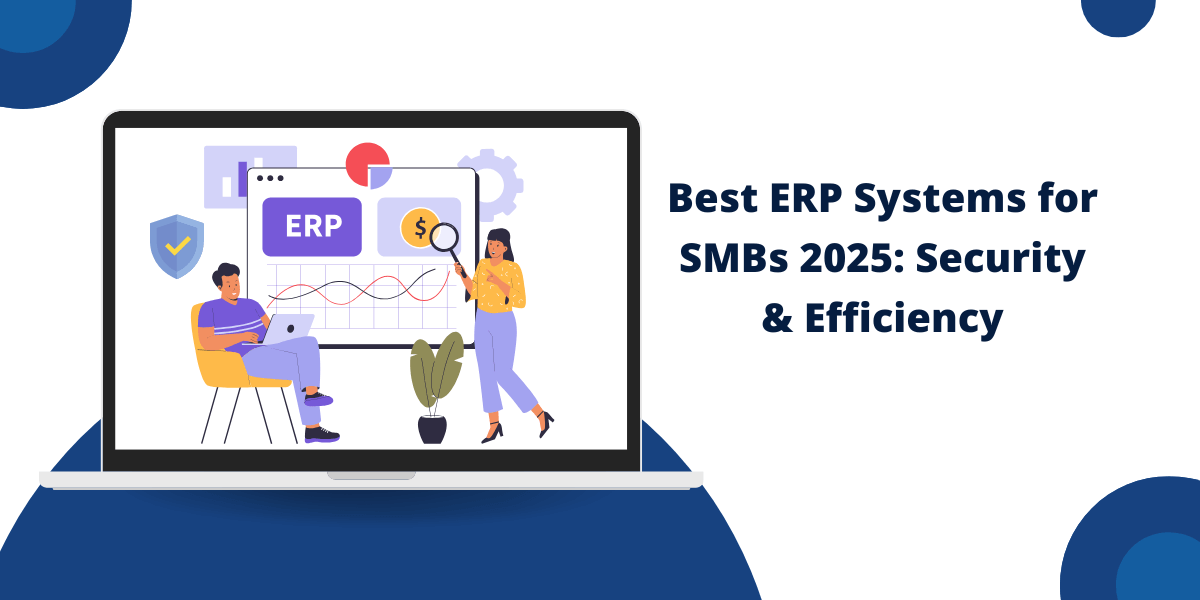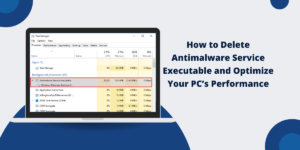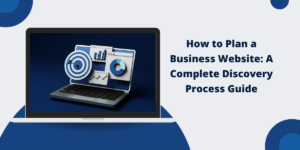Today, operating a small or mid-sized business involves more than just providing outstanding services or selling fantastic goods; it also entails remaining safe, effective, and prepared for expansion. ERP systems designed for the expansion of small and mid-sized businesses in 2025 can help with that. These tools are no longer just “big company software.” They are now more intelligent, user-friendly, and surprisingly reasonably priced for companies of all kinds.
The worst part is that although ERP systems facilitate growth, they also create new avenues for cyber threats. That’s why business owners in 2025 need to look at ERP not just as a way to boost operations but also as a way to strengthen data security.
In this guide, we will examine:
- The significance of ERP for expanding companies in 2025
- The top ERP systems shaping the market
- How to safeguard company information when implementing ERP
- Easy steps to choose the best ERP for security and growth
The Significance of ERP for Small and Mid-Sized Enterprises in 2025
Consider your company’s control center to be ERP (Enterprise Resource Planning). ERP unifies accounting, HR, inventory, and sales onto a single platform, eliminating the need to manage multiple apps.
The following are some advantages for small and mid-sized enterprises in 2025:
- Real-time visibility: Constantly be aware of your inventory, cash flow, and customer orders.
- Decisions are made more quickly: Without waiting on spreadsheets, get insights right away.
- Scalability: As your business expands, add more users, modules, or automation tools.
- Improved teamwork: Rather than exchanging files via email, teams share the same data.
- Security built-in: Cloud ERPs now come with encryption, access controls, and compliance features.
A recent study shows that 82% of SMBs adopting ERP in 2025 report faster decision-making, while 68% credit ERP for reducing financial errors.
The Top ERP Systems for 2025
A brief overview of some of the ERP platforms that small and mid-sized companies are using this year is provided below:
1. NetSuite ERP
- Cloud-first and highly scalable.
- Strong financial tools, great for businesses aiming to grow fast.
- Integrated conformance for sectors with stringent data laws.
2. Microsoft Dynamics 365 Business Central
- Easily integrates with Teams and Office 365.
- Excellent for companies that are already a part of the Microsoft ecosystem.
- Provides AI insights for more accurate forecasting.
3. SAP S/4HANA Cloud (GROW with SAP)
- Subscription-based and quick to implement.
- Automation tools driven by AI.
- Robust cybersecurity measures, such as frequent updates and encryption.
4. Odoo
- Open-source adaptability.
- Modular and reasonably priced, this is perfect for SMBs with particular requirements.
- Driven by the community and offering a wide range of integrations.
5. Oracle NetSuite Alternatives
If you’re exploring beyond the giants, check out curated guides like this one: ERP systems built for small and mid-sized business growth in 2025. It’s a great starting point if you’re weighing different options.
Security Challenges of ERP in 2025
ERP streamlines business operations while combining sensitive data, including supply chain, payroll, finance, and customer information. That makes ERP platforms a prime target for cyber threats.
Here are the top risks to watch:
- Phishing attacks targeting ERP login credentials.
- Data breaches if systems aren’t patched regularly.
- Weak access controls that let employees see more than they should.
- Hidden vulnerabilities are caused by third-party integrations.
- Risks to compliance if ERP data is not managed appropriately in accordance with regulations such as GDPR or PCI DSS.
This is why picking the right ERP means checking both features for growth and security strength.
Best Practices: How to Secure Your ERP System
If you’re adopting ERP in 2025, here’s how to keep it safe:
- Activate multi-factor authentication (MFA): A single password is insufficient.
- Employ role-based access controls: Provide workers with only the information they require.
- Protect sensitive information: While it’s in transit and at rest by encrypting it.
- Update regularly: Cybercriminals love outdated software.
- Train your team: Human error is still the #1 cause of breaches.
- Work with trusted vendors: Stick to ERP providers that invest in security and compliance.
How to Pick the Best ERP for Security and Growth
When choosing your 2025 ERP, consider the following:
- Does it fit my size today and my growth tomorrow?
- Is it equipped with robust security features?
- Is it possible to integrate it with my current tools without disclosing any data?
- How much does it cost in total, including licenses, implementation, and support?
- Is there a history of patches and updates from the vendor?
Pro tip: Choose more than just the most well-liked or least expensive option. Select the ERP that best suits your company’s objectives and protects your data.
New Developments in ERP in 2025
The ERP landscape is changing fast. The following trends are influencing the year:
- Insights driven by AI that identify risks and forecast demand.
- ERP apps designed for mobile devices so that teams can collaborate safely while on the go.
- SMBs can modify ERPs without large budgets thanks to low-code customization.
- Sustainability features tracking carbon footprint and green initiatives.
Industry-Specific ERP Solutions
Not all industries need the same ERP. Examples include:
- Manufacturing: Advanced scheduling, shop-floor tracking.
- Retail: Omnichannel sales, POS integrations.
- Healthcare: Compliance-heavy, secure patient data handling.
- Professional Services: Project billing and resource management.
The ROI of ERP for SMBs
ERP is an investment—but the returns can be huge:
- Lower costs through automation.
- More sales thanks to faster response times.
- Stronger compliance reducing risk of fines.
- Happier teams with less manual work.
Research indicates that after implementing ERP, SMBs frequently see a return on investment in as little as 18 to 24 months.
Typical Errors to Avoid When Selecting ERP
- Skipping a needs assessment and rushing into a choice.
- Underestimating training needs – tools are only useful if people know how to use them.
- Ignoring security in favor of low cost.
- Over-customizing and making upgrades harder later.
Case Study: ERP Success for a Mid-Sized Retailer
Early in 2024, a mid-sized retail chain implemented cloud ERP. Within a year they:
- Cut manual inventory tasks by 60%.
- Enhanced data security through encrypted transactions and multi-factor authentication.
- Real-time inventory visibility causes saw sales to increase by 15%.
This example shows how the right ERP fuels both growth and security.
Final Thoughts
By 2025, ERP systems are more than just corporate tools. For small and mid-sized enterprises, they serve as growth engines, facilitating operations management, rapid scaling, and competitiveness.
However, enormous power also carries a great deal of responsibility. Security must be given equal weight with features and cost when combining data into a single ERP.
Investigating reliable comparisons, such as ERP systems built for small and mid‑sized business growth in 2025, is a wise step if you’re assessing your options. It’s the ideal approach to align your expansion objectives with a safe, expandable ERP system.
Your Next Step
Selecting an ERP need not be a daunting task. Be modest at first:
Define your growth goals.
Write down your top security concerns.
ERP systems that fit both should be shortlisted.
After completing that, you will be prepared to select an ERP that will not only expand with your company but also safeguard your data in a constantly changing digital landscape.
Frequently Asked Questions (FAQ)
Which ERP is best for small businesses in 2025?
Your objectives will determine this. Dynamics 365 integrates seamlessly with Microsoft tools, NetSuite excels at scalability, and Odoo is reasonably priced for new businesses. Always consider both features and security.
How much does ERP cost small and medium-sized businesses?
Prices differ greatly. Basic cloud ERP systems start at $40 per user per month, while more sophisticated platforms like SAP or NetSuite can cost hundreds of dollars per user per month. Include the cost of training and implementation.
Can sensitive business data be safely stored in ERP systems?
Yes, provided that you select a reliable supplier and activate features like encryption, role-based access controls, and multi-factor authentication. Updates on a regular basis are essential.
How long does it take a mid-sized company to implement ERP?
It can take a few weeks for simpler cloud systems and six to twelve months for larger, multi-module deployments, depending on the complexity.
What errors in ERP adoption should SMBs steer clear of?
Avoid choosing based solely on price, neglecting employee training, skipping a proper needs assessment, and ignoring long-term scalability and security.
Can ERP actually increase small businesses’ return on investment?
Indeed. Most SMBs report lower costs, faster decision-making, and stronger compliance. After adopting ERP, many see a return on investment in 18 to 24 months.
For SMBs, is cloud ERP superior to on-premise ERP?
In 2025, cloud ERP will be the better option for the majority of SMBs. It provides easier scaling, integrated security, automatic updates, and reduced upfront costs.
Is regulatory compliance aided by ERP systems?
Indeed. Tools for complying with GDPR, PCI DSS, HIPAA, and other regulations are included in a lot of contemporary ERPs. They have functions like reporting, safe data storage, and audit trails.
Is it possible for a small business to begin using ERP and grow later?
Of course. Numerous ERP providers provide modular systems, allowing you to begin with essential features like accounting and expand as your business needs them by adding modules like supply chain management or CRM.
How important is employee training to the success of ERP?
Training is crucial. If employees are unable to use the ERP, even the best ones will fail. Higher adoption rates, fewer mistakes, and a quicker return on investment are all guaranteed by effective training.

Priya Mervana
 Verified Web Security Experts
Verified Web Security Experts
Priya Mervana is working at SSLInsights.com as a web security expert with over 10 years of experience writing about encryption, SSL certificates, and online privacy. She aims to make complex security topics easily understandable for everyday internet users.



